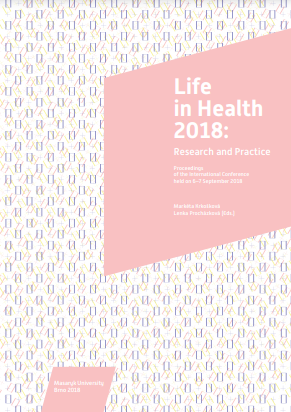Short Interventions as a Means of Increasing Patient Health Literacy
Short Interventions as a Means of Increasing Patient Health Literacy
Author(s): Dagmar Škochová, Lidmila Hamplová, Soňa Jexová, Renata Procházková, Eva Marková, Jana Hlinovská
Subject(s): Methodology and research technology, Health and medicine and law
Published by: Masarykova univerzita nakladatelství
Keywords: individual interventions; method of brief intervention; health literacy; strategy of health support; the role of health care professionals in the support of public health;
Summary/Abstract: The strategic document released by the government of the Czech Republic “Health 2020” – National Health Protection and Support Strategy and Disease Prevention is aimed to start effective and long-term sustainable mechanisms to improve medical condition of the population. For the fulfilment of this strategy were 13 action plans processed, including concrete aims, responsibility, indicators and performance dates for key priority issues in the field of the support of public health. The action plan No 12 Development of the health literacy is devoted to the increase of health literacy of target population groups. A subsidy scheme of the Ministry of Health “National Health Programme – Health Support Projects” is intended to support action plans activities and tasks. Improving health literacy leading to the elimination or diminishing risk factors resulting from the lifestyle of intervened participants and strengthening their responsibility for their own health is the aim of the short interventions recommended by WHO as an effective and inexpensive education method. The level of risk of the chosen lifestyle impacting the patient’s health is measured by standardized WHO questionnaires for the addiction field and NIPH (the National Institute of Public Health) questionnaires for the nutrition and physical activity. After the performed intervention its effectiveness is evaluated, that means level of influencing behaviour and attitude of the intervened person by means of a short questionnaire. Activities aimed at increasing the health literacy of target population groups are supported from the subsidy programme of the public health protection and support of the Ministry of Health of the Czech Republic. A project of the Medical College Prague dealing with short interventions about lifestyle risks of in-patients as well as out-patients in health centres and hospitals in the whole Czech Republic, where bachelor students of the Medical College Prague perform their traineeship or students in distance learning have been already working was financially supported 2016–2017. Students were trained in the method of short intervention using a set of 24 education cards created by the National Institute of Public Health. Interventions were performed in outpatient and inpatient wards of health-care facilities throughout the Czech Republic from 1 January 2016 till 31 December 2017. The level of risk of the chosen lifestyle impacting the patient’s health was measured by standardized WHO (FTQ and AUDIT) questionnaires for the addiction field and NIPH questionnaires for the nutrition and physical activity and knowledge about influenza vaccination (NIPH and Medical College questionnaires). After the performed intervention its effectiveness was evaluated, that means the level of influencing behaviour and attitude of the intervened person by means of a short questionnaire. All data found in the course of the questionnaire inquire were transformed into electronic data, then analysed and evaluated. In the implementation framework of this 2-year-project 3,905 patients in total from 63 health facilities were intervened with 6,365 and intervened 5,890 lifestyle risk factors. The most patients were educated on various wards in the General University Hospital in Prague which Medical College has a very good log-term collaboration with. Intervention effectiveness in the implemented project framework was evaluated on the basis of a short questionnaire inquire performed after the intervention. As a whole, 45.7% intervened patients stated their intention to increase their physical activity resulting from the performed intervention, 49% stated their intention to reduce smoking, 18.1% decided to break their smoking habit and 13.8% considered visiting a centre for smoking cessation. As a result of the intervention, 43.8% patients made a decision about cutting down on alcohol. 48.7% intervened participants decided to adjust their unhealthy diet. The intervention was regarded as an intrusion into the privacy mostly in the alcohol consumption field (23.8%). The project implementation by the Medical College contributes to fulfilment of national action plans and the strategy Health 2020. In the frame of implementation of this 2-year-project almost 4,000 participants were educated. The medical environment of interventions makes a significant contribution to the method success. The project implementation through the Medical College Prague was very appreciated by the Ministry of Health and the Medical College Prague contributed with this project to the fulfilment of national action plans that were approved by the government of the Czech Republic, in particular AP 12 Development of the health literacy.
- Page Range: 37-41
- Page Count: 5
- Publication Year: 2018
- Language: English
- Content File-PDF

